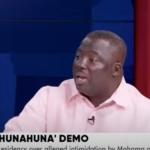
The Deputy General Secretary of the opposition National Democratic Congress (NDC), Mustapha Gbande, has downplayed the impact of the New Patriotic Party’s (NPP) protest in Accra, describing it as a political gimmick that will not deter the government from enforcing the law.
Speaking in response to the “Yɛn Suro Ahunahuna” demonstration organised by the NPP’s National Youth Wing on Monday, September 23, Mr Gbande stressed that no amount of street protests would shield party members from accountability if they broke the law.
“These gimmicks of demonstrations will not stop anybody. We will hold their balls to the fire. There will be more arrests, more prosecutions. The least of the things this government is doing is harassment,” he asserted on JoyNews’ The Pulse.
According to him, while some critics accuse the government of targeting outspoken voices, there have also been deliberate attempts to “tame firebrands” within the NDC to create a sense of balance.
He dismissed suggestions that such moves amounted to political intimidation, insisting he has always spoken his mind without arrogance.
“I am not arrogant. From day one, I have spoken my mind and told the truth. If I need to apologise, I will, but I have never been arrogant,” he emphasised.
The protest, led by NPP National Youth Organiser Salam Mustapha and National Organiser Henry Nana Boakye (Nana B), was triggered by the arrest of the party’s Bono Regional Chairman, Kwame Baffoe, popularly known as Abronye DC. He was detained on September 8 and charged with offensive conduct likely to cause a breach of peace and publishing false news.
Beyond Abronye’s case, the demonstrators accused the police of showing bias in handling political matters and cited a pattern of alleged harassment against NPP members. They pointed to incidents involving party figures such as Bernard Antwi-Boasiako, popularly known as Chairman Wontumi, as well as several pro-NPP social media activists.
The youth wing is demanding an end to what it calls politically motivated arrests and remands, which they believe disproportionately affect opposition members.